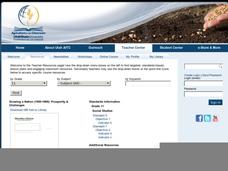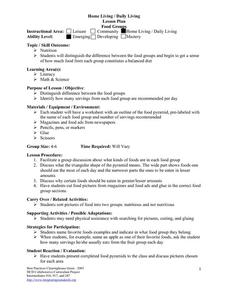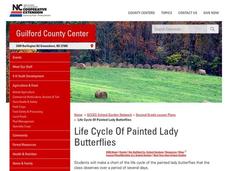Curated OER
Farming: It's a Fact
What does it take to work in agribusiness? Conduct and explorative investigation which describes where our food dollars go, who makes money on what we buy, and jobs related to agriculture. The class plays an interactive game, analyzes a...
Curated OER
How Much is Dirt Worth?
Dirt is worthless, isn't it? Find out the true value of dirt, and by dirt I mean soil. The class explores what makes soil, the types of soil, and what happens when soil becomes void of its nutrients. There are several great activities,...
Curated OER
Space Age Technology Comes to Earth
Both GPS and GIS are now used regularly in agricultural careers. Explore the new technologies that require higher education for those interested in agri-science careers. Upper graders examine how agriculturalists use new technologies by...
Curated OER
What is Biotechnology?
Young consumers explore the concept of biotechnology as it pertains to the foods they eat, economics, and agriculture. They watch several videos, explore a website, complete worksheets, and engage in class discussion. Son they'll know...
Curated OER
What's Your Agricultural Experience?
Consider sharing information about a fast growing career cluster with your class. They'll discuss the careers and higher education associated with agricultural careers. A worksheet, web links, and video links make exploring the world of...
Agriculture in the Classroom
Understanding the Columbian Exchange Through Old World and New World Foods
If you're interested in teaching your class about the impact of the Columbian Exchange on contemporary society, this is worth a look. The plan begins with an introduction to the topic, which stems from a cell phone poll...
Agriculture in the Classroom
Growing a Nation (1930-1949): From Defeat to Victory, Lesson 2
Using primary source materials including radio broadcasts, films, and interview transcripts, history students gain a better understanding of the Dust Bowl, relief efforts for farmers, and the nation's agricultural past. It includes...
Agriculture in the Classroom
Growing a Nation (1950-1969): Prosperity & Challenges: The Story of American Agriculture
A wonderful instructional activity on the development and impact of mechanized farming! History or agriculture classes learn the historical background of the United States' food production by creating a pamphlet with information on the...
Agriculture in the Classroom
Growing a Nation: Into a New Millennium 1970-Present
If you want to focus on critical thinking skills, this well-constructed series of activities will challenge your history or agriculture class to evaluate the effectiveness of administrative decisions related to agricultural and the...
Curated OER
Food Pyramid Relay Race
Students explore healthy eating habits by conducting a physical food challenge. In this food pyramid lesson, students identify the main concepts behind the food pyramid and what choices they should be making with their food intake....
Curated OER
Calorie Calculations through Beach Activities
Beach activity separates babes from blobs! Your class learns about calculating the number of calories used during physical activity. A worksheet is provided in which the activity of five different people at the beach is listed for...
Smithsonian Institution
Be a Food Detective
What are packaged food products really made of? This activity will prompt your learners to consider and investigate the source of ingredients in their food. They begin by breaking into groups and analyzing food labels by identifying...
August House
Go to Sleep, Gecko
Use this multidisciplinary lesson to delve into these subjects: English language arts, math, science, drama, and character education. After reading, discussing, and making interpretations about Go To Sleep, Gecko!: A Balinese Folktale by...
Curated OER
Your Energy Balance Goal!
This is the culminating activity for a unit on energy balance for 3rd-5th graders created by Together Counts. Young learners make a plan to balance their energy in and their energy out for one month. They use the SMART steps in creating...
Curated OER
Black Tiger Academy Martial Arts Fitness Unit – Lesson 9
"Education is the most powerful weapon which you can use to change the world.”—Nelson Mandela. Black Tiger Academy’s martial arts lesson nine of 20 introduces food labels to the class. What are food labels? What do they mean? How can...
Curated OER
Home Living/ Daily Living: Food Pyramid
What did you have for lunch? Did it contain all four food groups? Help your special education class make good food choices and recognize foods in each of the four food groups. They look at images and discuss the foods on the food pyramid...
Curated OER
Home Living/ Daily Living: Food Groups
What are the best foods to eat, and how much is too much? Kids discuss the importance of eating the right amount of each of the four food groups. They discuss the food pyramid and make meals by cutting and pasting foods from a magazine...
NC Cooperative Extension, Guilford County Center
Life Cycle Of Painted Lady Butterflies
The Very Hungry Caterpillar is the inspiration for this project-based learning activity. Kindergartners create a lifecycle chart for a butterfly with four sections: egg, caterpillar, pupa, and butterfly. It is a three-dimensional...
Curated OER
Neuron Cookie
Find out just how enticing learning about neurons can be by creating models with sugar cookies, icing, and candy. With great background information for you and an easy procedure for the kids, studying cells has never been more fun or...
Baylor College
Do Plants Need Light?
Turn your classroom into a greenhouse with a lesson on plant growth. First, investigate the different parts of seeds, identifying the seed coat, cotyledon, and embryo. Then plant the seeds and watch them grow! Measure the new plants...
Baylor College
Body Mass Index (BMI)
How do you calculate your Body Mass Index, and why is this information a valuable indicator of health? Class members discover not only what BMI is and practice calculating it using the height and weight of six fictitious individuals, but...
Baylor College
What's Is Soil Made Of?
It's time to roll up those sleeves and get a little dirty in the second lesson of this series on the science of food. Investigate where plants and animals get the minerals they need to live in this two-part exploration of soil. First,...
Baylor College
Plant Parts You Eat
Plants provide a variety of delicious foods essential for human survival. In the fourth lesson of this series on food science, young scientists investigate common fruits, vegetables, and grains in order to determine which plant part is...
Baylor College
Bio Build-up
Trace pollutants through the environment in the seventh lesson of this series on the science of food. Looking at a picture of the plants and animals in an aquatic ecosystem, learners use dot stickers to represent harmful chemicals as...
Other popular searches
- Health Nutrition and Sports
- Nutrition and Diet
- Food and Nutrition
- Nutrition Lesson Plans
- Nutrition Math
- Health and Nutrition
- Nutrition Sports
- Depression Nutrition
- Health Nutrition
- Nutrition and Diet Exercise
- Proper Nutrition
- Health Nutrition and Diet

























